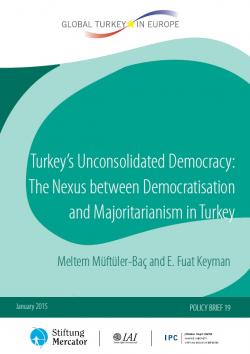Turkey's Unconsolidated Democracy: The Nexus between Democratisation and Majoritarianism in Turkey
A new era in Turkish politics seemed to have launched in 2002 when the Justice and Development Party (AKP) first came to power and has since then steadily increased its electoral support becoming the dominant party in Turkish politics. While multiple political and legal reforms were adopted under its rule, the systemic deficiencies in Turkish politics have, nonetheless, slowly crept up. This policy brief argues that the Turkish democratic consolidation process is impacted by the systemic tendencies of "dominant party" politics, a democratic disconnect within the Turkish society, a weak system of checks and balances, and, most importantly, an inherent intolerance of diversity and plurality. It is in light of these systemic deficiencies that the process of Turkish democratic consolidation is turning into a majoritarian authoritarianism.
Paper produced within the framework of the project Turkey, Europe and the World and presented to the seminar "Challenges to Democratic Consolidation in Turkey", Brussels, 19 January 2015.
-
Details
Roma, Istituto affari internazionali, January 2015, 6 p. -
Issue
Policy brief 19
Introduction
The Dominant Party System
The Downturn in Turkish Democracy
The Systemic Failures: Checks and Balances
Conclusion
Topic
Tag
Related content
-
Publication11/06/2015
Global Turkey in Europe III
leggi tutto -
Event22/01/2015
Challenges to Democratic Consolidation in Turkey
leggi tutto -
Ricerca27/12/2013
Global Turkey in Europe
leggi tutto



